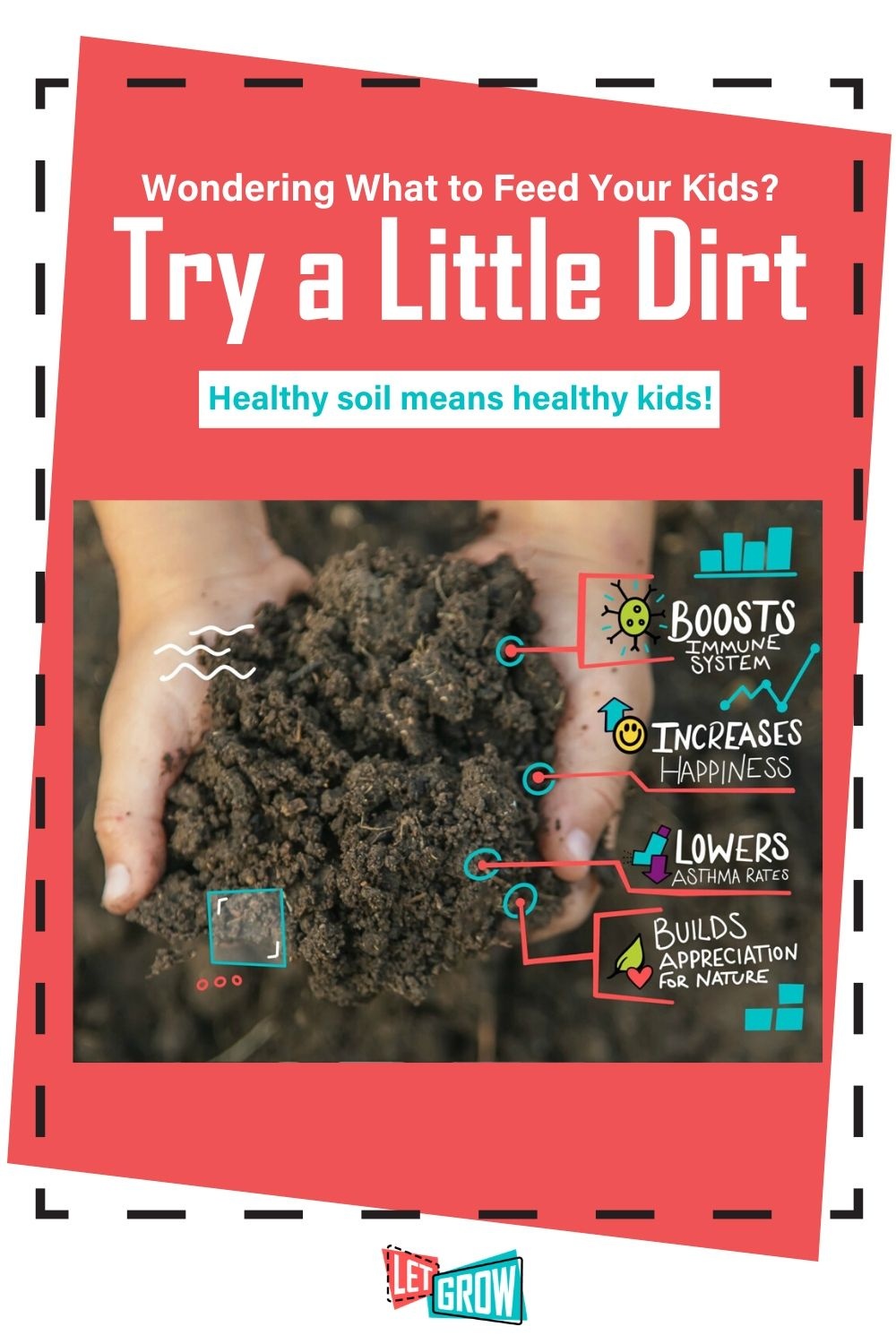






Wondering What to Feed Your Kids? Try a Little Dirt
If you need one more reason to get your kids outside to play, soil microbes may be the extra nudge you need. Hidden inside the dirt is soil bacteria that science has discovered helps boost the immune system, increase happiness, and fight cancer cells. All of which makes playing in the dirt and going outside a healthy activity. Yet, are kids getting enough of these friendly microbes in the soil?
In some places (especially in Western Europe, North America, and Australia), food allergies have increased by 10%, and the rates of type-1 diabetes, Crohn’s disease, multiple sclerosis, and asthma have shot up 300% or higher in the past 70 years. Could a lack of these microbes be part of the cause?
Eating dirt just might be good for us and even make us happier.
The reasons for the uptick in asthma and allergies could be consistent with the fact that today people aren’t as exposed to the microbial world. Soil microbes are microorganisms, like bacteria and fungi, living in the dirt. It’s thought that in one teaspoon of soil, there may be 10,000 to 50,000 microbes. That’s a lot of beneficial bacteria.
Under our children’s feet is a vibrant ecosystem of plants and bacteria. As the plants grow, they feed microbes. This, in turn, creates fertile, nutrient-rich microbial soil that could help build a healthy immune system in children. As a child “throws dirt around,” the microbes enter their body, exposing it to a variety of germs and helping their body learn to fight disease and boost its happiness level.
Cytokines are proteins secreted by the cells to help regulate our children’s immune systems and inflammation. When our kiddos have more cytokines, they produce more serotonin—the happy hormone. Prozac, a well-known antidepressant, helps balance serotonin levels. But we and our children also have the ability do this naturally.
Low serotonin levels have been associated with higher levels of anxiety, depression, and obsessive-compulsive disorder (OCD). Playing and kicking up dirt full of Mycobacterium vaccae may help boost serotonin levels and reduce mental-health concerns for children, according to this article published in Discover magazine.
Do soil microbes lower rates of asthma and allergies?
There may be other benefits as well. Children in some Amish communities have lower rates of asthma, says Live Science. Researchers at the University of Chicago believe the reason for this is the dust in the homes from neighboring dairy farms. In the dust are bacteria and fungi that may boost the immune system and expose children to germs.
In the last few decades, the hygiene hypothesis has emerged. The idea is that kids live in an environment that is too sterile and isolated from the beneficial microbes. You might be thinking, here’s to a dirty house (who wants to do the dishes?). But don’t throw away the disinfectant wipes yet.
Living in a sanitized environment has reduced cases of measles, mumps, and other infectious diseases. Washing our hands, and teaching our children to do the same, is an essential part of preventing infections. Our immune system may be in terrible shape, not from personal hygiene, but from not being exposed to soil microbes.
While throwing your kids out to play is pretty much how most kids rolled in the ’80s and ’90s, times have changed. Smart screens and parents’ fears about people harming their kids have reduced the amount of time kids play outside. Plus, the pollution of our soil and rampant use of antibiotics limits the number of soil microbes kids ingest.
As parents, we can increase our kids’ exposure to the beneficial soil microbes.
Spring has arrived, and out come the gardening tools. We can unearth the soil microbes with our kids in tow to provide some togetherness while also developing their immune system and happiness levels. Gardening is a sensory experience, with water, seeds, and piles of luscious dirt as essential parts of the process. Children can practice crucial fine-motor skills, such as grabbing and pinching earth.
Another way to use gardening to boost immunity is to plan what you plant. Vegetables full of immune-system-boosting powers include bell peppers, broccoli, garlic, and spinach. If you prefer the fruit variety, citrus fruits, such as lemons and oranges, are full of vitamin C, which helps fight off infections.
Gardening with kids not only aids physical growth but helps with cognitive development. We can increase microbial levels while teaching kids about fruits, vegetables, flowers, and plants. We’re also teaching them to interact with the earth, potentially leading to an appreciation of nature.
Another way for children to take in soil microbes is by eating a healthy diet. Plants that are grown in organic soil and served up in tasty dishes inject your little ones with nutrients and bacteria. Fermented foods such as sauerkraut and kimchi add a probiotic surge to help children recover faster from illness.
Pets expose children to healthy bacteria.
While pets may not be the best solution (hello, something else to take care of), animals may give your kiddos a microbial protective shield against chronic inflammatory disorders. The Independent, UK reports that living with pets boosts your immune system and reduces instances of asthma in babies. The docuseries Babies on Netflix shows that children in households with pets soak up an abundance of bacteria and fungi through licks and cuddles.
For most parents, encouraging their children to take a walk outside or throw some dirt around is a no-brainer. What we really didn’t know is that getting out also trains the immune system, through exposure to important soil microbes. So, the next time you tell your kiddos to get outside and play, you’re telling them to eat some healthy bacteria that not only prevent diseases but adds more happiness to their lives.




Comments are closed for this article.